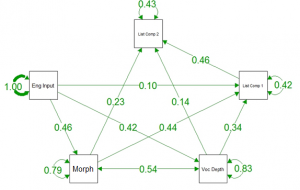What we found: Phase 2
Which skills best predict listening comprehension at the end of Year 1?
Similarly to our results from Phase 1 (beginning of Year 1), many language abilities continue to influence comprehension at the end of Year 1. We used our measures at Phase 1 to determine if these can predict listening comprehension at Phase 2, so we can now assess the relationship between vocabulary, grammar and listening comprehension over time.
Vocabulary depth, i.e. children’s knowledge about the association and relationship between words, and morpho-syntactic knowledge, i.e. knowledge of word forms and sentence structures, both measured at the beginning of Year 1, continue to play a significant role in predicting listening comprehension at the end of Year 1.
Morpho-syntactic knowledge seems particularly important, with children with better initial morpho-syntactic knowledge having better listening comprehension skills at the end of Year 1, even when accounting for their listening comprehension at the beginning of Year 1.
Amount of English input was directly linked to vocabulary knowledge and to grammatical knowledge – morpho-syntax, and had an indirect effect on English listening comprehension.

In summary
Similarly to our results at Phase 1, a good knowledge of grammatical rules and a deep knowledge of words and their relationship both have a positive effect on the comprehension of an oral text from the beginning (Phase 1) to the end of Year 1 (Phase 2).
Amount of English input plays a crucial role in determining how many words children know – and how well – and how much they know about the grammatical rules of the language. These are language skills that, in turn, are directly linked to their ability to make sense of a story.
